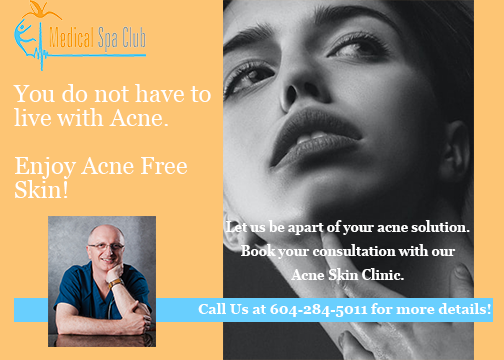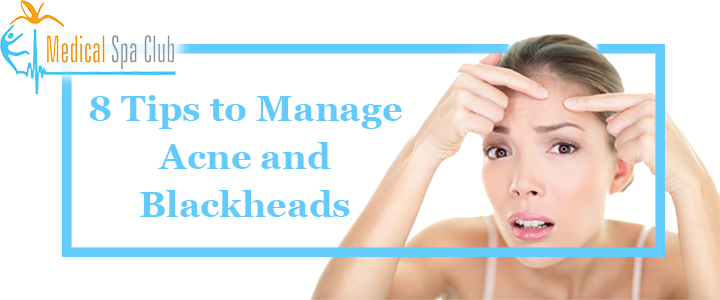8 Tips For Managing Acne and Blackheads
What is Acne and What are “Blackheads”?
Acne and blackheads can be a huge confidence killer because they are not very appealing and are often times painful. Acne, also known as acne vulgar, is a disorder that affects the skin’s oil (sebaceous) glands and hair follicles. Each follicle contains one hair and a sebaceous gland that produces oil, called sebum, that helps keep your skin soft. Dead skin cells can plug up the opening to the skin surface, producing a bump called a “Comedo”.
If the comedo does not open to the skin surface, a “whitehead” is produced. If the comedo opens to the skin surface, the oil and cellular debris is oxidized, resulting in a “blackhead”. If skin bacteria get into the comedo, a pimple develops. If a pimple develops in a blocked portion of sebaceous gland deeper in the skin, it becomes a cystic acne lesion.
Did you know..
Acne is the most common skin disorder. Anyone can get acne, but it is most common in teens and young adults. An estimated 80% of people between ages 11 and 30 have acne outbreaks at some point.
Most Pimples are found on the face, neck, back, chest, and shoulders. Acne is usually not a serious health threat, but it can cause scars.
How Can You Prevent Acne and Blackheads?
Acne flares up in teens because of elevated sex hormone levels which cause a sharp increase in oil production by skin’s sebaceous glands. Treatments aimed at controlling the sebaceous glands and skin’s oil production can control acne and minimize future breakouts. Sensible skin hygiene and using skin care products that are designed not to exacerbate acne also help.
8 Tips for Managing Acne and Blackheads

You can reduce your acne by following these simple skin care tips:
- Wash twice a day and after sweating. Perspiration, especially when wearing a hat or helmet, can make acne worse, so wash your skin as soon as possible after sweating.
- Use your fingertips to apply a gentle, non-abrasive cleanser. Using a washcloth, mesh sponge or anything else abrasive can irritate the skin.
- Be gentle with your skin. Use gentle products, such as those that are alcohol-free. Do not use products that irritate your skin. Dry, red skin makes acne appear worse.
- Scrubbing your skin can make acne worse. Avoid the temptation to scrub your skin.
- Use oil-free, non-comedogenic skin care products. Any skin care product that contains oil can contribute to new blackheads. Choose oil-free or non-comedogenic makeup, lotions, and sunscreens to avoid making your problem worse.
- Try an exfoliating product. Exfoliating skin care products and masks remove dead skin cells from your face and can help reduce black-heads. Look for products that don’t irritate your skin.
- Let your skin heal naturally. If you pick, pop or squeeze your acne, your skin will take longer to clear and you increase the risk of getting acne scars.
- Consult a doctor if:
- Your acne is leaving scars or darkening your skin
- Products you’ve tried have not worked
- Your acne makes you shy or embarrassed
Acne and Blackheads are still a Problem?
There are treatments available for acne and blackheads, and in present times, every case of acne can be successfully treated. Doctors can help treat existing acne, prevent new breakouts, and reduce your chance of developing scars. If you have questions or concerns about caring for your skin, you should make an appointment to see a doctor.
There are several effective treatments for acne. It may be a matter of managing a medical condition such as hormonal issue. There are also a number of medications and skin care products that can help, which include:
- Exfoliative products such as Salicylic acid and Glycolic acid remove superficial dead skin cells and debris, thus helping to unclog pores and prevent lesions. Exfoliation does not impede sebum production and does not kill bacteria.
- Benzoyl Peroxide and antibiotics kill the existing P. Acnes bacteria inside your pores.
- Topical Retinol and its’ derivatives such as Differin work to keep pimples from being able to form. These agents accelerate turnover of skin cells and decrease swelling and inflammation. Your acne may appear to get worse before it gets better because the pimples that have already started forming beneath your skin will to sufrace. These products may take 8-12 weeks to get results.
Non-Invasive Medical Procedures
If medications do not provide you with sufficient relief, there are a multitude of new treatments available to you thanks to recent advances in aesthetic medicine. These treatments include:
- Lasers, BBL, other Light Therapies, and Radiofrequency: These devices kill the P.Acnes bacteria and slow down sebum production, thus decreasing food supply for the bacteria. Your doctor can determine whether this type of treatment can be helpful.
- Chemical Peels: There is a variety of types and strengths of chemical peels used for treatment of acne and scars. You ma be able to purchase some of the weaker chemical peels for home use for maintenance, but stronger peels should be performed in a medical facility.
- Microdermabrasion: is a gentle treatment whereby a special instrument that contains a rough surface to sand the top layers of your skin removes superficial layer of dead skin cells and debris that clog the pores and cause blackheads. Microdermabrasion does not require an anesthetic, and works on all skin types and colours.
- Lesion Removal: Comedones may be extracted by a skin care professional using a special comedone extraction instrument. Cystic acne lesions may require Cortisone injection, drainage, or excision.
Keep in mind, these treatments must be done by a professional for safe and long lasting results. Come see us at Medical Spa Club if you want professional advice on how you can enjoy acne free skin! Consult with Dr. Pinkhasik today!






